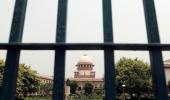
Justice Jasti Chelameswar, the senior-most judge of the Supreme Court after the Chief Justice of India, who led three senior judges to an unprecedented press conference, mounting a virtual revolt against CJI Dipak Misra, will demit office on Friday after a nearly seven-year tenure in the top court.
Along with justices Ranjan Gogoi, M B Lokur and Kurian Joseph, he had raised questions on 'selective' allocation of cases, including the sensitive case of special Central Bureau of Investigation judge B H Loya, who died on December 1, 2014.
The press meet on January 12 , the first in the chequered history of the Supreme Court, had sent waves in the court's corridors and caught the nation by surprise.
In hard-hitting remarks, Justice Chelameswar had said, "Many things that are less than desirable happened in the last few months."
"Unless this institution (Supreme Court) is preserved and it maintains its equanimity, democracy will not survive in this country, or any country. The survival of a democracy, it is said, the hallmark of a good democracy, is an independent and impartial judge," he had said.
Justice Chelameswar, who turns 65 on Friday, was part of the nine-judge bench that that gave the historic verdict declaring right to privacy a fundamental right.
In a separate but concurring verdict, Justice Chelameswar had said in August last year that fundamental rights were the only constitutional firewall to prevent State's interference with those core freedoms constituting liberty of a human being.
The right to privacy was certainly one of the core freedoms which was to be defended, he had said, noting that it was part of liberty within the meaning of that expression in Article 21 (right to life and personal liberty).
Justice Chelameswar, who was also part of the five-judge Constitution bench led by Justice J S Khehar that had scrapped the National Judicial Appointments Commission (NJAC) Act to deal with appointments in higher judiciary, was the lone dissenting judge.
He had observed that 'proceedings of the collegium were absolutely opaque and inaccessible both to public and history'.
Opposing the Collegium system of judges appointing judges, he had taken a decision after the 2016 NJAC verdict to opt out of the Supreme Court Collegium meetings till the highest judiciary ushered in transparency.
However, later he took part in collegium meetings.
In one of its meetings, the five-member collegium, including him, had recently agreed in principle to reiterate the name of Uttarakhand high court Chief Justice K M Joseph for Supreme Court judgeship after the Centre had returned the file seeking re-consideration.
Justice Chelameswar was also part of the bench that had struck down controversial Section 66A of the Information Technology Act which provided the law enforcement agencies the power to arrest a person for posting offensive contents on web the grounds of violation of Fundamental Rights.
He was also heading the three-judge bench that had referred the pleas against Aadhaar to the larger bench while making it clear that no person shall be deprived of social benefits due to want of the 12-digit national unique identification number (Aadhaar).
In an unusual step, Justice Chelameswar had refused the invitation of the Supreme Court Bar Association to participate in a farewell function.
However, he followed the tradition and sat on the bench along with CJI Misra on May 18, his last working day in the apex court before it closed for the summer vacation.
He also was lauded by top lawyers for his judicial approach, with former law minister Shanti Bhushan even equating him with Justice H R Khanna, the lone dissenting voice in a verdict that had upheld the suspension of fundamental rights during the Emergency.
He batted for transparency in the functioning of the Collegium. Once, he refused to attend collegium meetings.
Later, the Collegium resolved to post on the court's website its recommendations on judicial appointments, transfers and elevations for public consumption.
Recently, a bench comprising justices Chelameswar and S Abdul Nazeer ruled that politicians, their spouses and dependents would now have to declare their sources of income, along with their assets, for contesting elections.
In another landmark judgment, the apex court had passed a slew of measures to reform the electoral process, observing that the 'purity' of electoral process was fundamental to the 'survival of a healthy democracy'.
Born on June 23, 1953 at Pedda Muttevi, Movya Mandal in Krishna district of Andhra Pradesh, he had his early education at Hindu High School at Machilipatnam in Krishna district and graduated in Physics from Loyola College in Chennai (then Madras).
He attained his law degree from Andhra University, Visakhapatnam, in 1976.
He was designated as a senior counsel in 1995 and appointed as additional advocate general of Andhra Pradesh on October 13, 1995.
Justice Chelameswar was elevated as additional judge of Andhra Pradesh high court on June 23, 1997 and as judge with effect from May 17, 1999.
He was elevated as chief justice of the Gauhati high court on May 3, 2007 and later transferred to the Kerala high court.
He assumed charge as the chief justice of Kerala high court on March 17, 2010.
Justice Chelameswar was elevated as a judge to the Supreme Court on October 10, 2011.










